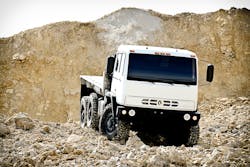If materials or services must be taken off road and into rough terrain, what’s the best way to accomplish it? Acela Truck Co., a recently started enterprise in Montana, says it’s with former military cargo trucks it refurbishes and sells.
Acela’s Monterra 4x4 and 6x6 cab-over-engine trucks are from the U.S. Army’s Family of Medium Tactical Vehicles, or FMTVs, which claimed reliability of more than 95 percent, according to David Rosen, Acela’s president. The trucks have been retired, and Acela buys them from the Department of Defense. They are Class 6, 7, and 8 vehicles that feature Caterpillar midrange diesels and Allison automatic transmissions, plus all-wheel drive and a high stance that enables them to traverse rough trails or pathless terrain, and ford streams up to 30 inches deep.
“What we offer is access” to difficult locations at a low price, Rosen says. A new civilian-design chassis with similar capabilities would cost $300,000 to $500,000, but Monterra prices start at $95,000. Though fully reconditioned to better-than-new status, the trucks are considered used, so are exempt from diesel emissions limits faced by new trucks. As built for the Army by Stewart & Stevenson starting in the early 1990s, and later by BAE Automotive, their engines have no exhaust-gas recirculation or aftertreatment equipment.
“We sell them as used trucks,” Rosen says. “For emissions purposes, it’s inside or outside of California. Outside, it’s a used vehicle with no restrictions. In California we are extremely restricted, so it’s very difficult there.” Acela sells direct to users, but some dealers have inquired about taking on the Acela line and a dealer body might be established.
“All trucks go through a production line and assembly line process,” called “resetting,” at a plant in Belgrade, Mont., near Bozeman, he says. “On the line, they are torn down to the frame rails, completely inspected, and rebuilt. We install 650 new parts.” Then they are reassembled, tested, repainted, and made ready for sale. Engines and transmissions have low hours so usually need little attention. The Acela plant can rebuild 200 trucks a year, which could be expanded to 400 if necessary, Rosen says. Enough orders are in hand for 90 days of production.
Initial units went to work in the Alberta tar sands region of Canada, where they haul supplies and specialized equipment for the oil extraction process, he says. A prospective customer in Louisiana is interested in using one or more Monterras to support earthmoving equipment.
“‘We’ve got all that heavy yellow iron working,’” the customer told Rosen. “‘Every night we have to get a service truck out there,’ and with this they could do it without having to grade a road to the site,” Rosen says. “They want to take this and put a service body on it. It’s got 34-inch standard frame-rail spacing and is very body-friendly.” Monterras can be fitted with bodies to haul fuel, water, bucket booms, light towers, and water pumps and many other uses.
“In North America, because the demand (for serious off-road trucks) is relatively low, it’s a niche market” of about 3,000 trucks a year, he says. “We’re creating the market as we go.” Although their primary mission is off-road, “we can re-gear the trucks to do 74 mph top speed, and they drive as stably and as well as anything else out there.
The trucks are fantastic,” Rosen says. “The Army did a great job designing these things.” Learn more about medium-duty trucks, classes 4 - 6, 14,001 to 26,000 GVW.





